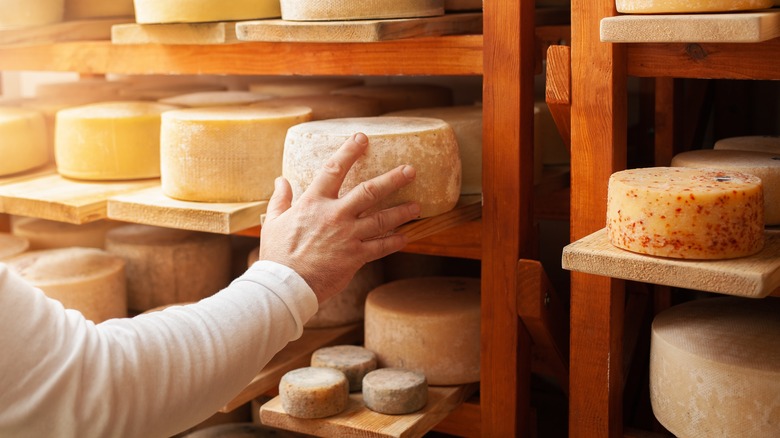Avoid Eating This Type Of Cheese If You Get Migraines
The Cleveland Clinic explains that a migraine is a type of headache characterized by a throbbing pain on one side of the head. Normally migraines last for less than four hours, but they can linger for days at a time. They are also severe enough that they can interfere with a person's daily life. In addition to headaches, migraine symptoms can include watery eyes, fatigue, irritability, nausea, and vision changes. People might also not have a headache at all, a condition known as "silent migraine."
A variety of things can trigger a migraine, according to the Mayo Clinic, including movement, lights, sounds, and strong smells. Another common migraine trigger is foods that are rich in tyramine. Tyramine is a protein that is naturally found in some foods, especially those that are aged and fermented. Foods that may contain high amounts of tyramine include some types of beer, cured meats, smoked fish, and aged cheeses (per WebMD).
These aged cheeses are more prone to causing migraines
Cabot Creamery says aged cheeses go through a process called "affinage." This means that they are left to cure for a period of weeks, months, or years, which gives them their unique flavor profiles. This process also makes them higher in tyramine.
WebMD lists cheddar, Stilton, blue, Camembert, Swiss, feta, Muenster, and Parmesan as cheeses that are higher in tyramine. On the other hand, American cheese, cottage cheese, farmer's cheese, cream cheese, and soy cheese tend to be lower in tyramine.
The National Headache Foundation states that American, cottage, farmer, ricotta, cream cheese, Velveeta, and low-fat processed cheese are an acceptable part of a low-tyramine diet. However, they urge caution with Parmesan or Romano. They suggest that 2 teaspoons of these can be used as a garnish or minor ingredient. Their list of cheeses to completely avoid includes blue, brick, brie, cheddar, Swiss, Roquefort, Stilton, mozzarella, provolone, and Emmentaler.
How tyramine triggers migraines
The Migraine Relief Center notes that humans have an enzyme called "monoamine oxidase" that helps to break down tyramine. If you don't have enough of this enzyme, eating large amounts of tyramine can lead to migraines.
However, it's not clear exactly why this happens. Scientists think it could due to the fact that tyramine causes nerve cells to release too much norepinephrine. It could also be that elevated tyramine and norepinephrine lead to brain changes conducive to headaches.
Aged cheeses are also of concern to people who are using antidepressants known as "monoamine oxidase inhibitors." These medications interfere with the breakdown of tyramine and can cause it to reach high levels. This build-up of tyramine can lead to a dangerous increase in blood pressure known as a "hypertensive crisis." One of the hallmark symptoms of a hypertensive crisis is a severe headache (per Mayo Clinic). However, Axon Optics clarifies that this type of headache is not the same as a migraine. They are caused by two different mechanisms.


